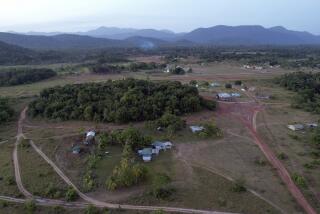Will Our Northern Neighbor Divorce? : Canada: A vote on separatist sentiment in Quebec may dash the country’s potential as an exemplar of multiculturalism.
Canada’s possible dissolution may be an innocuous event to many outsiders, but an immense tragedy to others more directly concerned. If English-speaking and French-speaking Canadians can’t get along, can anyone? No wonder the Bosnians and Serbs are having at it.
Quebecers will vote Monday in an election that will turn largely on the sentiment for or against independence. Both parties have deliberately sought to focus on such immediate concerns as unemployment to garner the most votes during a summer campaign in which most Canadians would rather be tending barbecues than listening to politicians.
Quebec’s Liberal Party government has stridently demanded more power for the province. The opposition Parti Quebecois is committed to outright secession, and is leading in the polls. Many predict a sweeping victory that will produce an overwhelming separatist majority in Quebec’s Legislative Assembly.
Worse, English-speaking Canada’s frustrated cries of “What does Quebec want?” seem to have been replaced, by many, with an infuriated but stone cold sober, “Let the bastards go.” And well they may have to. While the polls have shown a slight decline in the PQ’s commanding lead, they have also revealed a hardening of support among its likely voters for an immediate, post-election “declaration of independence” by the new, PQ-dominated legislature. The results and the legality of such a move would be far from certain, but such an act would almost certainly spell the end of Canada as we know it.
And, while the PQ and its counterpart in the federal Parliament, the Bloc Quebecois, are talking of a peaceful secession accompanied by the continued use of Canada’s currency, postal system and armed forces, many English speakers and their political leaders will have no part of this self-serving scenario.
In 1968, Canadians had high hopes. The governing Liberals had just chosen Pierre Trudeau, a dashing intellectual, to be prime minister. He had campaigned by speaking of a multinational state--in Canada, that’s the two “founding nations,” English and French--and the need to tear down walls between all cultures, races and nations.
But the honeymoon soon ended. In 1970, Trudeau invoked Canada’s equivalent of martial law following separatist bombings, kidnapings and murders in Quebec. Quebec elected its first separatist, Parti Quebecois government a few years later. It lost a referendum on independence, but the caldron of anger, insults and resentment continued to boil.
One round of negotiations aimed at placating Quebec followed another. Then, in 1992, Canadians dealt a stunning--and unexpected--defeat to a referendum proposing constitutional amendments that would have guaranteed Quebec a place in the confederation.
The headlines in Canada these days are not about whether Quebec will “separate,” but what its borders will be. While the United States may soon have to contend with a quasi-socialist neighbor on its north--one that supplies much of New York City’s electricity--Canadians have other concerns. Will an independent Quebec grab the parts of Labrador that it once owned and has long since craved? And what of the French-speaking suburbs of Ottawa, the seat of the governments that have poured billions into Quebec to secure its loyalty? And what of Quebec’s tens of thousands of indigenous people, citizens of Canada bound to--and protected by--the federal government?
And then, no one is sure that the remaining provinces can--or will--hang together. Canada’s prosperous but underpopulated West seethes with resentment against the powerful East; with Quebec’s third of the seats in Parliament gone, would the West stand for a new Parliament dominated by politicians from Toronto?
Finally, there’s the specter of troops. Prime Minister Jean Chretien could well send Canadian troops into Quebec to protect federal property or to make sure that Quebec agrees to pay its sizable share of the astronomical national debt.
But the most prominent separatist, Lucien Bouchard, and his Bloc Quebecois constitute Chretien’s official opposition in Parliament. Furious English-speakers have questioned whether the bloc’s status is treasonable since it is committed to the country’s destruction. Their anger has escalated as Bouchard traipses around the world, in his capacity as leader of the opposition and at the taxpayers’ expense, assuring foreign leaders that Canada’s passing will be peaceful and mutual.
If ever a country had potential, it’s Canada, which the United Nations just rated as having the world’s best quality of life. (The United States barely made it into the top 10.) Canada has never had to bear the military or economic burdens of a superpower. It could have shown the world how two different peoples--who once had as much in common as not--could share a single state. In doing so, Canada could have been great. Instead, it has shown the world only how best to squander its great promise.
More to Read
Sign up for Essential California
The most important California stories and recommendations in your inbox every morning.
You may occasionally receive promotional content from the Los Angeles Times.










